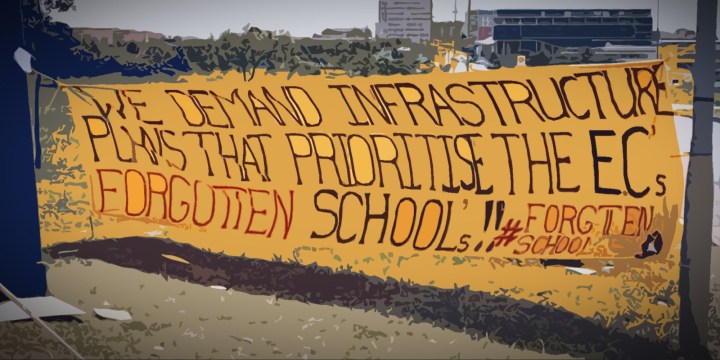DEADLINE TIME
Provincial education departments set to fail again to improve infrastructure at public schools

Sunday 29 November marks the deadline for provincial education departments to provide enough classrooms, electricity, water, toilets, perimeter fencing, telephones and internet for all schools. This is according to the legislated norms and standards for school infrastructure. Despite this looming deadline, provinces are nowhere near to fulfilling some of these obligations.
The promulgation of the legally required school infrastructure norms and standards in 2013 signalled a new beginning for South Africa’s public schools most affected by poor infrastructure.
Ntsiki Dlulani, Equal Education’s (EE) head of organising in the Western Cape, was in Grade 11 at the time. She was also an active member (Equaliser) of the EE community.
“We had pickets, night vigils and [at some point] slept outside parliament. We understood the impact of education and so we kept fighting.
“What motivated us at the time was that we never wanted our younger sisters and brothers to suffer from the same inequalities in the education system that we did,” Dlulani said.
EE had campaigned for uniform norms and standards for school infrastructure in SA’s schools.
Now, years later, Dlulani still sees the inadequacies and tardiness of the department of basic education (DBE) and provincial education departments (PED) in implementing the norms and standards.
She was speaking during a webinar organised by EE and the Equal Education Law Centre (EELC) to discuss the successes and failures of the government’s implementation of the norms and standards ahead of the 29 November deadline.
A deputy principal from the Eastern Cape, Wonga Ndzamela, outlined how he is forced to teach in undignified conditions.
He said that out of his school’s 19 classrooms, four were built by the former Transkei ‘government’. The other nine were built by the community.
“In our school there are about 350 girls who have to share four dilapidated toilets,” he said.
He added that “367 schoolboys are using four dilapidated toilets and none of them has doors”.
The 29 teaching and non-teaching staff also share four toilets, two of which were recently installed as a result of the Covid-19 pandemic.
“We don’t have what we call a school… we have rooms that are knitted together and conveniently termed a school,” said Ndzamela.
The school has no library or laboratories and the wi-fi they once enjoyed for about two years was disconnected without any explanation from the department of education.
Hopolanga Selebalo, EE’s co-head of research, said the provision of school infrastructure did not merely have implications for the safety and dignity of learners and educators, but that there were also implications for the processes of teaching and learning.
“School infrastructure is not a nice-to-have. You must have it to facilitate a conducive learning environment to ensure positive learning outcomes,” she said
The latest provincial reports submitted to the DBE on progress to implement the school infrastructure norms and standards indicate that provinces will once again fail to meet the requirements.
In 2016, the deadline to eradicate unsafe structures such as mud schools and asbestos, metal or wood buildings wasn’t met either.
Selebalo said that despite a court order compelling the DBE and provincial education departments to make public their progress reports on improving school infrastructure, that had not happened.
“We always have to submit a Promotion of Access to Information Act (PAIA) application to get the reports.
“This is despite the Bisho high court ruling in 2018 that these reports must be made publicly available because school communities deserve transparency,” she said.
The Bisho judgment also found that the current norms and standards legislation excluded many schools from benefiting from the regulations.
The judgment only recognises that schools made entirely of unsafe materials must be prioritised, and leaves out schools that might be partially or significantly affected by unsafe materials.
The court further ruled that parts of the 2013 law were unconstitutional and had to be amended to clarify and use language that would ensure every school benefitted from the legislation.
“It hasn’t been finalised unfortunately, and it is a process being prolonged by the department of basic education,” said Tarryn Cooper-Bell, an attorney at EE’s law centre.
Commenting on the legal implications of not meeting Sunday’s deadline, Cooper-Bell said although implementation of the law had been slow, “we can’t say that the minister [of basic education, Angie Motshekga] is doing nothing or disregarding the norms and standards entirely”.
She added that provincial education departments were the ones that decided on these deadlines.
“The department did not impose these deadlines… the court did not impose these deadlines… Equal Education did not impose them either.
“These are dates the [provincial] departments chose for themselves and they are now missing them. And by doing that they are going against the law.” DM




















 Become an Insider
Become an Insider
And? Did anyone expect the anc to pay any attention to the law?